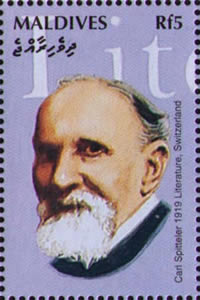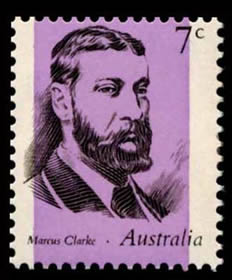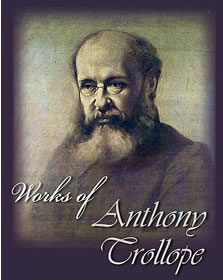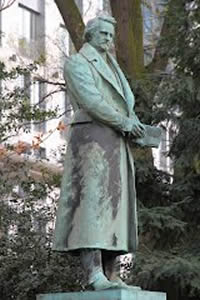|
De Zwitser dichter, schrijver, essayist en criticus Carl Friedrich Georg Spitteler (eig. Carl Felix Tandem) werd geboren op 24 april 1845 in Liestal bij Basel. Zie ook alle tags voor Carl Spitteler op dit blog.
xml:namespace prefix = o ns = "urn:schemas-microsoft-com:office:office" />
Pfauenauge
Ein kühles Schloß, ein schattiger Palast von Nesseln. -
Dicke Marienkäferchen mit rundem Schild
Reisen geschäftig trippelnd durch die Jalousien.
Zuoberst unterm Dache, am Mansardenfenster
Sitzt äsend eine schwarze, blaugeperlte Raupe.
Plötzlich ein dunkler Tulpenschein verdeckt die Aussicht -
Und schlüpfend in die Nesseln durch das schmale Fenster
Ein Pfauenauge zieht in seine Jugendheimat.
Flatternd durcheilt es die geliebten Säle, rot
Mit blut'gem Flammenlicht erhellend den Palast.
Plötzlich entspringt es durch die Tür. Ein Blitz. Verschwunden.
Aber die Raupe, ob dem Purpurflammenspiel
Jählings erfaßt von unnennbarer Seelensehnsucht,
Steigt auf das Dach und klettert an der steilen Mauer
Empor zum Sims. Daselbst, hangend in freier Luft,
Spinnt sie sich ab von aller Welt und träumt und dichtet.
Ob ihrem Träumen färbt und schildert sich ihr Wesen;
Ob ihrem Dichten füllt sie sich mit rotem Herzblut;
Während die Wintersonne, glitzernd überm Eis,
Schmückt ihr den Helm mit Gold und stählt den Schild und Panzer.
Bis daß nach langer Zeit an einem Mai und Morgen
Die Grille zirpt und schreit die Lerche überm Saatfeld:
Da zwängt und drängt sie sich ans Licht nach heft'gen Krämpfen
Und weint fünf Tropfen zähen Blutes. Plötzlich - ha! -
Bin ich es selbst? Mich dünkt, ich spüre Geist und Flügel!
Es hebt und trägt mich! Auf! empor zum hohen Himmel!
Gefahr zu suchen und die weite Welt zu messen.
Das höchste Los und Glück auf Erden nenn' ich mein:
Leibhaft zu wissen meinen besten Seelenschein
Und was ich vormals stumm bewundert selbst zu sein.

Carl Spitteler (24 april 1845 29 december 1924)
De Australische schrijver Marcus Clarke werd geboren op 24 april 1846 in Londen. Zie ook alle tags voor Marcus Clarke op dit blog.
Uit: For the Term of His Natural Life
Having thus made preparations for supper, he ascended a pathway which led to the highest point of the rock. His fetters compelled him to take short steps, and, as he walked, he winced as though the iron bit him. A handkerchief or strip of cloth was twisted round his left ankle; on which the circlet had chafed a sore. Painfully and slowly, he gained his destination, and flinging himself on the ground,
gazed around him. The afternoon had been stormy, and the rays of the setting sun shone redly on the turbid and rushing waters of the bay. On the right lay Sarah Island; on the left the bleak shore of the opposite and the tall peak of the Frenchman's Cap; while the storm hung sullenly over the barren hills to the eastward. Below him appeared the only sign of life. A brig was being towed up the harbour
by two convict-manned boats.
The sight of this brig seemed to rouse in the mind of the solitary of the rock a strain of reflection, for, sinking his chin upon his hand, he fixed his eyes on the incoming vessel, and immersed himself
in moody thought. More than an hour had passed, yet he did not move. The ship anchored, the boats detached themselves from her sides, the sun sank, and the bay was plunged in gloom. Lights began to twinkle along the shore of the settlement. The little fire died, and the water in the iron pot grew cold; yet the watcher on the rock did not stir. With his eyes staring into the gloom, and fixed steadily on the vessel, he lay along the barren cliff of his lonely prison as motionless as the rock on which he had stretched himself.
This solitary man was Rufus Dawes.

Marcus Clarke (24 april 1846 2 augustus 1881)
De Engelse schrijver Anthony Trollope werd geboren in Londen op 24 april 1815. Zie ook alle tags voor Anthony Trollope op dit blog.
Uit: The Genius of Nathaniel Hawthorne
And so in the world of melancholy romance, of agony more realistic than melancholy, to which Hawthorne brings his readers, there is compensation to the reader in the feeling that, in having submitted himself to such sublime affliction, he has proved himself capable of sublimity. The bird that feeds upon your vitals would not have gorged himself with common flesh. You are beyond measure depressed by the weird tale that is told to you, but you become conscious of a certain grandness of nature in being susceptible of such suffernig. When you hear what Hawthorne has done to others, you long to search his volumes. [p. 239] When he has operated upon you, you would not for worlds have foregone it. You have been ennobled by that familiarity with sorrow. You have been, as it were, sent through the fire and purged of so much of of your dross. For a time, at least, you have been free from the mundane touch of that beef and ale with which novelists of a meaner school will certainly bring you in contact. No one will feel himself ennobled at once by having read one of my novels. But Hawthorne, when you have studied him, will be very precious to you. He will have plunged you into melancholy, he will have overshadowed you with black forebodings, he will almost have crushed you with imaginary sorrows; but he will have enabled you to feel yourself an inch taller during the process. Something of the sublimity of the transcendent, something of the mysery of the unfathomable, something of the brightness of the celestial, will have attached itself to you, and you will all but think that you too ought to live to be sublime and revel in mingled light and mystery.
The creations of American literature generally are no doubt more given to the speculative, -- less given to the realistic, -- than are those of English literature. On our side of the water we deal more with beef and ale, and less with dreams.

Anthony Trollope (24 april 1815 - 6 december 1882)
De Duitse dichter en schrijver Karl Leberecht Immermann werd geboren op 24 april 1796 in Magdeburg. Zie ook alle tags voor Karl Immermann op dit blog.
Bei trübem Wetter
Sie sprach zu mir in dieser Tage Grauen,
Wo alle Wolkenschläuche niederregnen:
Wenn Sonne scheinet, will ich dir begegnen
An unsrem Haag, auf unsrere Blumen-Auen.
So laß, o schöne Sonne, laß dich schauen!
Blick' neubelebt aus deinem Leichentuche,
Und mach', entlastet von dem nassen Fluche,
Den Himmel reingewaschen wieder blauen.
Belohnt wird, ich versprech's, dir deine Güte.
Willst du dich meinen Wünschen gnädig neigen,
Soll sich das Schönste deinen Augen zeigen.
Glaubst du etwa, es prahle mein Gemüte?
Das Liebchen kommt, wenn unsre Sonne strahlet;
Nun güldnes Tages-Aug', hab' ich geprahlet?

Karl Immermann (24 april 1796 25 augustus 1840)
Standbeeld in Düsseldorf
|



